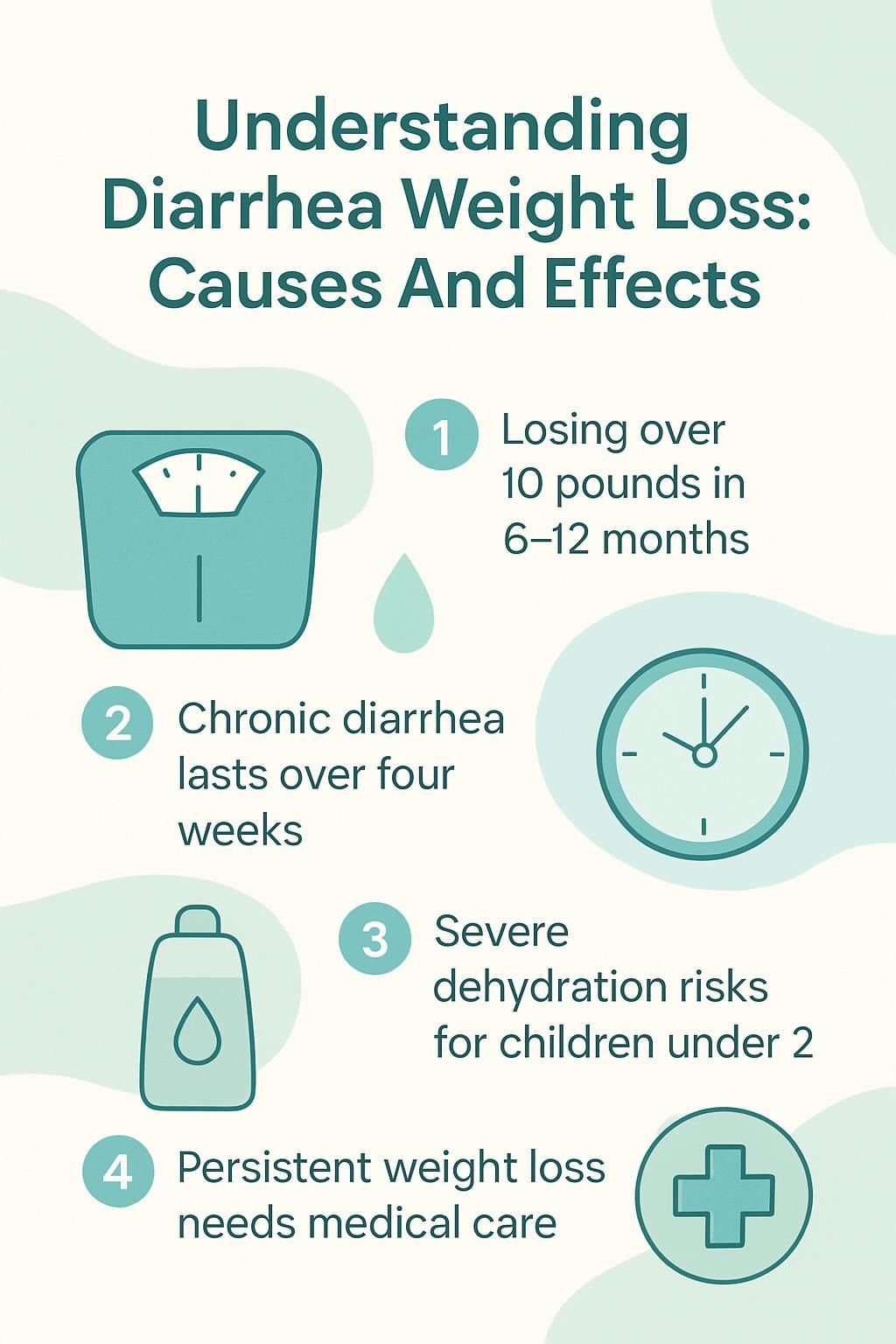Understanding Diarrhea Weight Loss: Causes And Effects
Our Nutrition Assistant AI Suite will transform your body. You will lose fat, get toned, and build muscle. Gain confidence and optimal health.
If sudden weight changes show up along with frequent loose stools, it is reasonable to worry about diarrhea and weight loss. Diarrhea can pull fluid and nutrients out of your body fast, which may cause a quick drop on the scale.
This guide explains why diarrhea causes weight changes, which health conditions can be involved, and how to spot urgent warning signs. Keep reading for clear answers and practical steps.
Key Takeaways
- Early weight loss with diarrhea is mostly water weight from fluid and electrolyte loss, not fat. Untreated cases can lead to dehydration and poor nutrition.
- Chronic diarrhea lasting more than four weeks may signal conditions such as Crohn’s disease, celiac disease, or ulcerative colitis. Rare cancers like enteropathy-associated T-cell lymphoma can also present this way.
- Severe dehydration signs include dark urine, dry mouth, fast heartbeat, and fainting. These risks are higher in young children and people receiving chemotherapy, including CHOP regimens.
- Significant unintentional weight loss means losing more than 10 pounds or 5 percent of body weight in 6 to 12 months without diet or exercise changes.
- Get prompt medical care for diarrhea with persistent weight loss, blood in stool, or signs of malnutrition to prevent dangerous complications.

What is diarrhea?

Diarrhea means passing loose, watery stool more often than your usual pattern. It is common, but it can affect your digestive health and sometimes your weight.
What is the medical definition of diarrhea?
Clinicians define diarrhea as three or more episodes of loose or watery stool in a day. Acute diarrhea lasts less than two weeks. Persistent diarrhea lasts two to four weeks. It becomes chronic if it continues longer than four weeks.
Along with watery bowel movements, you may notice nausea, tiredness, belly pain, fever, or blood in the stool. Changes in stool consistency and frequency help guide a medical diagnosis.
What are the most common causes of diarrhea?
Infections from bacteria, viruses, or parasites often trigger diarrhea. Sources include foodborne illness, unsafe water, or close contact with someone who is sick. Conditions like irritable bowel syndrome, Crohn’s disease, and ulcerative colitis can also cause frequent episodes.
Food intolerances matter too. Lactose intolerance makes digesting milk and dairy hard. Some sugar alcohols in sugar-free gum or candy, such as sorbitol and mannitol, can upset your stomach.
Medications can play a role. Antibiotics may disrupt gut bacteria. Metformin, some NSAIDs, certain antidepressants, and many chemotherapy medicines can cause loose stools. Acute cases often follow infections or sudden diet changes. Chronic diarrhea is more likely with long-term conditions or ongoing medication effects.
I once had traveler’s diarrhea after visiting another country. Symptoms started fast after I drank local tap water.
Diarrhea is mostly the result of your digestive tract reacting to infections, new foods, medications, or underlying health conditions.
How diarrhea causes weight loss
Diarrhea can cause weight loss because each loose stool removes water and nutrients. Frequent bouts can drain your reserves and affect your nutrition.
How does diarrhea lead to weight loss?
Frequent watery stools flush out water and electrolytes quickly. The first weight you lose is mostly water weight, which explains sudden drops on the scale during a bout of diarrhea. This rapid loss can cause dehydration and make you feel weak or dizzy.
When diarrhea is severe or continues, your intestines may not absorb enough protein, vitamins, or calories. That slows recovery and may lead to more weight loss. Abdominal pain, bloating, and nausea can suppress appetite, so you take in less energy.
If symptoms last longer than three days, or you notice steady weight loss without trying, it is time to learn how fluid and electrolyte losses affect your health.
What role do fluid and electrolyte losses play?
Diarrhea drains fluids and electrolytes, including sodium, potassium, and magnesium, from your gastrointestinal tract. Large losses can cause dehydration, muscle cramps, low blood pressure, and abnormal heart rhythms.
Severe dehydration can harm kidney function or disrupt your body’s salt balance. Watch for very thirsty feelings, dry mouth, dark urine, or fatigue as early signs.
Young children face higher risks of complications. Oral rehydration solutions that contain sodium, glucose, and potassium are recommended for kids and adults. These solutions match how the intestine absorbs fluid, which helps speed recovery.
I had severe gastroenteritis after a local festival in the United States. My urine turned dark yellow and I felt lightheaded after many bathroom trips. Water helped a little, but I improved much faster after using an over-the-counter electrolyte drink.
Losing too much fluid from diarrhea is more dangerous than most people expect, said Dr. Gina Smith, a gastroenterologist. Watching for signs like dry mouth or fatigue is important, especially for young kids.
How does diarrhea affect nutrient absorption?
Loose, frequent stools move through the small intestine and colon too quickly. Nutrients have less time to absorb into your bloodstream. Protein, fats, carbohydrates, vitamins, and minerals may pass through unused.
Chronic diarrhea can lead to malnutrition or deficiencies. Conditions such as celiac disease, Crohn’s disease, or pancreatic insufficiency cause inflammation or enzyme problems that damage absorption. A damaged gut can struggle to absorb nutrients even from a balanced diet.
Some deficiencies appear quickly when diarrhea persists. Potassium can drop, which may cause weakness or irregular heartbeats. Loss of iron or vitamin B12 can lead to anemia. If diarrhea and unexplained weight loss continue, look for the cause and get care early.
Causes of diarrhea-related weight loss
Diarrhea leads to weight loss when fluids, electrolytes, and nutrients leave the body faster than they are replaced. Understanding the cause helps you choose the right treatment for diarrhea and protect your health.
What causes acute diarrhea?
Infection is the main cause of acute diarrhea. Viruses, bacteria, and parasites can enter through contaminated food or water. Common sources include norovirus, rotavirus, Escherichia coli, and Salmonella. Food poisoning often causes watery stools for a few days. Some medicines, especially antibiotics and laxatives, can also trigger sudden loose stools.
Stress can upset the digestive system too. While traveling, my doctor explained how new germs and different foods can overwhelm the gut. That matched my experience with traveler’s diarrhea after drinking tap water on vacation.
If symptoms last more than three days, or if weight starts dropping, the cause may be more serious. The next section covers reasons for chronic diarrhea.
What causes chronic diarrhea?
Chronic diarrhea, which lasts longer than four weeks, often points to deeper issues. Ongoing infections, stress, and medicine side effects can all contribute. Conditions like irritable bowel syndrome, inflammatory bowel disease, or celiac disease are common causes.
Malabsorption can follow. The gut may fail to absorb nutrients, which leads to weight loss and fatigue. A family member of mine had diarrhea for weeks after starting a new prescription. Their doctor changed the medicine, and the symptoms eased.
Talk with a healthcare provider if diarrhea continues for more than four weeks, especially with weight loss, nausea, or severe belly pain. Testing can identify the exact cause and guide treatment.
What are malabsorption disorders?
Malabsorption disorders prevent your body from absorbing nutrients from food. Celiac disease, Crohn’s disease, and pancreatic insufficiency are common examples. In celiac disease, gluten triggers your immune system to attack your small intestine. Crohn’s disease inflames the gastrointestinal tract, which harms nutrient absorption. In pancreatic insufficiency, the pancreas does not release enough digestive enzymes to break down food.
Common signs include persistent diarrhea, unexplained weight loss, and signs of poor nutrition like fatigue, weakness, and skin changes. Bloating, cramping, and anemia can also appear. Testing may include stool tests, blood tests, endoscopy, colonoscopy, or small intestine biopsy.
As someone with celiac disease, I struggled with steady weight loss and daily gut symptoms until I was diagnosed. Treatment finally improved my energy and weight.
Medical conditions linked to diarrhea and weight loss
Several medical conditions, including Crohn’s disease, celiac disease, and certain lymphomas, can cause both diarrhea and weight loss. Knowing how they affect your body makes it easier to act early.
How does Crohn’s disease cause diarrhea and weight loss?
Crohn’s disease is an autoimmune condition that inflames the digestive tract. Inflammation damages the lining and causes chronic diarrhea. The intestine then absorbs less water and fewer nutrients.
Abdominal pain can reduce appetite, which lowers calorie intake. Ongoing inflammation also breaks down muscle and fat over time. That combination causes weight loss in many people with inflammatory bowel disease.
How does ulcerative colitis affect weight?
Ulcerative colitis, another inflammatory bowel disease, often causes diarrhea and unplanned weight loss. Inflamed tissue in the colon leads to frequent bowel movements and poor absorption.
Diarrhea can also reduce appetite, which further cuts calories. Severe cases may cause dehydration and electrolyte imbalance. Doctors often use prescription medicines to calm inflammation and help stabilize weight.
What is the connection between celiac disease and diarrhea?
Celiac disease is an autoimmune disease where eating gluten damages the small intestine. That damage causes malabsorption and frequent diarrhea. Even with normal portions, your body may not get enough nutrients.
Untreated celiac disease increases the risk of intestinal lymphoma, often a T-cell type. This adds strain to an already inflamed gut. If diarrhea lasts for weeks or weight drops without trying, ask your healthcare provider about testing for celiac disease.
Can irritable bowel syndrome (IBS) cause weight loss?
IBS can cause chronic diarrhea and abdominal discomfort. Significant weight loss is less common than with Crohn’s disease or celiac disease. Some people avoid meals to prevent symptoms, which may cause mild weight loss.
Unexpected or severe weight loss with IBS should be evaluated. A healthcare provider can check for other conditions that may be causing the change.
What is enteropathy-associated T-cell lymphoma (EATL)?
Enteropathy-associated T-cell lymphoma is a rare cancer of the intestinal lining. It involves immune cells called intraepithelial lymphocytes. Many cases are linked to celiac disease, though it can occur without a prior diagnosis.
Common symptoms include persistent diarrhea, rapid weight loss, and abdominal pain. Serious problems can include bowel obstruction or gastrointestinal perforation. Malnutrition can develop quickly, especially before or during chemotherapy like CHOP.
Outcomes vary, and treatment is complex. If you have ongoing diarrhea and weight loss with belly pain, contact your healthcare provider promptly.
What symptoms indicate serious diarrhea problems?
Some symptoms signal an urgent problem and need quick attention. Think of these as your early alarm system.
How to recognize severe dehydration?
Severe dehydration from diarrhea can harm your health quickly. Learn the main warning signs so you can act fast.
- Notice strong thirst or a dry, sticky mouth as early clues of fluid loss.
- Check urine color. Dark yellow or amber often signals dehydration and possible kidney stress.
- Watch for persistent fatigue, dizziness, confusion, or fainting after fluid losses.
- In infants, no wet diaper for three hours, crying without tears, fever, or marked irritability are danger signs.
- Pinch the skin on your forearm. If it snaps back slowly, you may be dehydrated.
- Monitor your pulse. A rapid heartbeat, especially with low blood pressure, can signal electrolyte loss.
- Severe dehydration can lead to kidney injury, especially if you have other conditions or use medicines that affect fluid balance.
If these symptoms appear with weight loss, seek medical care right away. Severe dehydration can become life threatening.
What causes fatigue and weakness with diarrhea?
Diarrhea causes loss of fluid and electrolytes. Dehydration alone can cause tiredness and muscle weakness. Low levels of sodium, potassium, and magnesium can worsen fatigue and cramping.
Malabsorption and low calorie intake add to the problem. Without enough nutrients, your body struggles to make energy. Even mild diarrhea can drain you if it lasts beyond a day or two.
When does abdominal pain and cramping become concerning?
Abdominal pain is concerning when it is severe, lasts several days, or worsens quickly. Serious causes include peritonitis, bowel obstruction, or rare cancers such as enteropathy-associated T-cell lymphoma. These can lead to emergencies like bowel perforation.
Blood in stool or a very swollen abdomen also signals trouble. If high fever, ongoing vomiting, or dehydration occurs along with cramps, seek care right away. During a trip, I had sharp cramps with diarrhea. My doctor ordered tests, including endoscopy, which helped prevent complications.
What does bloody or persistent diarrhea mean?
Blood in stool is a warning sign. It can point to inflammatory bowel disease, infections such as C. difficile, or even a tumor. Diarrhea that lasts more than three days also needs attention.
Do not ignore these symptoms. They may relate to microscopic colitis, peptic ulcer disease, or a reaction to a food allergy or supplement. I felt weak and dehydrated during a stretch of persistent diarrhea, which made eating and drinking tough. Medical teams recommend evaluation if rapid weight loss or malnutrition signs appear with ongoing diarrhea.
Next, you will see the signs of severe dehydration and how to recognize them early.
When should I see a doctor for diarrhea and weight loss?
Some patterns signal the need for medical care. Early action helps identify the cause of diarrhea, protects your weight, and prevents complications.
Why is diarrhea lasting more than 3 days a concern?
Diarrhea that lasts more than three days may signal a deeper illness. Continued fluid loss can cause dehydration and low electrolytes, which raises the risk of complications. After four days, your risk of deficiencies and malnutrition increases.
Clinicians advise seeking care if symptoms do not improve by day three. A close friend had severe diarrhea for five days after starting a high fat, low fiber diet. She grew weak and dehydrated. Timely care helped her recover.
What counts as significant or unintentional weight loss?
Significant unintentional weight loss means more than 10 pounds, about 4.5 kilograms, in six to twelve months without trying. Another marker is losing 5 percent of your usual body weight in that time. Dropping below a healthy range for your age or height is also concerning.
Pay attention to steady declines on the scale, especially with persistent diarrhea or loss of appetite. These patterns can signal malabsorption, celiac disease, chronic infections, or cancer such as enteropathy-associated T-cell lymphoma. Sudden diet changes, like heavy caffeine or alcohol use, can also upset the gut and worsen nutrient loss. Seek medical advice for unexplained changes.
What are symptoms of malnutrition to watch for?
Fatigue and weakness are common signs of malnutrition, especially with ongoing diarrhea. Quick, unintended weight loss can occur if your body fails to absorb enough nutrients. Deficiencies like low iron or vitamin B12 may cause pale skin, hair thinning, brittle nails, or tingling in fingers and toes.
People with diarrhea lasting more than four weeks face higher risks. Kids may grow more slowly or lose interest in food. Adults may feel tired even after rest. Mouth sores and slow healing can also point to poor nutrition tied to gut problems like celiac disease or Crohn’s disease.
Effects of diarrhea-related weight loss on the body
Diarrhea-related weight loss can lead to dehydration, weakness, and a higher risk of malnutrition. Knowing how these changes affect your body helps you protect yourself.
How does dehydration and electrolyte imbalance occur?
During diarrhea, fluid moves out of the gastrointestinal tract quickly. This rapid loss causes dehydration and can make you feel dizzy, tired, or weak. At the same time, you lose electrolytes like sodium, potassium, and magnesium, which keep your cells working.
Low electrolytes can trigger muscle cramps or irregular heartbeats. A drop in potassium, for example, can cause weakness or twitching. Severe dehydration can affect blood pressure and kidney function. After a stomach virus, I felt lightheaded and had muscle twitches. Electrolyte drinks helped those symptoms pass faster.
What are the risks of malnutrition and vitamin deficiencies?
Chronic diarrhea increases losses of fluids, calories, protein, and key vitamins. Weight often drops because the gut absorbs less than you eat. If losses continue, malnutrition can develop.
Vitamin deficiencies weaken your immune system and slow healing. Low vitamin A or zinc can raise your infection risk. Severe malnutrition may need supplements or intravenous nutrition. Many people with malabsorption need a nutrition plan and follow-up lab tests.
How can diarrhea weaken the immune system?
Diarrhea weakens defenses through nutrient loss. Water, electrolytes, and vitamins leave the body with each loose stool. Without enough vitamins A, D, and E and minerals like zinc, immune cells cannot work well.
When diarrhea persists, infections are more likely and recovery can be slower. Children are at special risk because they can become undernourished quickly.
How to prevent weight loss from diarrhea
Simple habits can reduce the risk of diarrhea-related weight loss. A few daily changes support gut recovery and protect your energy.
How can proper hydration help prevent weight loss?
Proper hydration limits weight loss during diarrhea by replacing what you lose.
- Increase fluids with water, clear broths, and electrolyte drinks to replace stool losses.
- Use oral rehydration solutions that include sodium and glucose. They improve absorption and are recommended by the World Health Organization.
- Take small sips often instead of large gulps. This can reduce nausea and help your intestines absorb fluids.
- Avoid alcohol and caffeinated drinks. They can worsen fluid loss.
- Watch for signs of dehydration such as dry mouth, dark urine, or dizziness. Seek care if symptoms are severe or last more than a day.
- For breastfeeding infants with diarrhea, nurse often. Breast milk provides both fluid and nutrition.
- Check your weight daily during a severe episode. Fast drops usually mean fluid loss, not fat changes.
- Consider electrolyte supplements during severe illness or after chemotherapy, including CHOP. A stable mineral balance supports cell function.
- Choose foods with high water content, such as soups and soft fruits, as you rehydrate.
- Add probiotic-rich foods when you start feeling better. They may help restore normal stool consistency and absorption.
What dietary changes reduce diarrhea risk?
Food choices can calm an irritated gut. Aim for gentle foods first, then build back slowly.
- Start with bland options like bananas, rice, baked chicken, and chicken soup until stool firm up.
- Avoid fatty, greasy, spicy, or dairy foods if they worsen symptoms.
- Increase easy fiber slowly with foods like white rice and applesauce to bulk stools.
- Eat smaller meals throughout the day. Large portions can overwhelm a sensitive intestine.
- Limit alcohol. It can irritate the bowel and upset fluid balance.
- Cut back on high sugar drinks and sodas. They may pull water into the gut and speed transit.
- Watch for food intolerances. Lactose intolerance commonly causes gas, cramps, and loose stools.
- Avoid artificial sweeteners like sorbitol in sugar-free gum or candies if they trigger symptoms.
- Add probiotic foods such as yogurt with live cultures after acute symptoms improve. These may support your gut microbiome.
- Cook meats well, like baking instead of frying. Undercooked meats raise infection risks.
Eating wisely can reduce symptoms and limit the link between diarrhea and weight changes.
Which common triggers should be avoided?
Some triggers repeatedly worsen diarrhea. Removing them for a short trial can help you see what matters most.
- Temporarily remove common allergens such as wheat, dairy, eggs, nuts, corn, and soy if you suspect reactions. Reintroduce one at a time while using a food diary.
- Limit sugar alcohols like sorbitol and mannitol found in sugar-free products if they cause loose stools.
- Review medicines with your doctor. Antibiotics, certain cancer drugs, and medicines used after stem cell transplant can cause diarrhea. Do not stop any medicine without guidance.
- Avoid fatty, fried foods during recovery. They often worsen symptoms.
- Reduce caffeine from coffee, tea, and energy drinks. It can increase gut movement.
- Skip alcohol while you recover. It irritates the digestive tract and adds fluid loss.
- Go easy on very spicy foods. They can aggravate sensitive intestines, especially in inflammatory bowel disease.
- Choose cooked vegetables over raw during recovery. They are easier to digest.
My own stomach settled faster once I removed artificial sweeteners during an illness. A simple change made symptom control easier.
Treatment options for diarrhea and weight loss
Treatment depends on the cause. The goal is to control symptoms, prevent dehydration, and target the underlying problem.
What over-the-counter medications are effective?
Loperamide, sold as Imodium, slows gut movement and reduces stool frequency. Bismuth subsalicylate, found in Pepto-Bismol, can ease upset stomach and diarrhea. Use these for mild to moderate cases.
Do not use anti-diarrheal medicines if you have blood in the stool or high fever. During a trip, I used loperamide for a short time until I got home to rest. Overusing these medicines can hide a serious illness. If symptoms last more than 48 hours or worsen, seek medical advice.
When are prescription medications necessary?
Prescription medicine is needed for many chronic conditions. Crohn’s disease, ulcerative colitis, and some IBS cases may require drugs to reduce inflammation, calm diarrhea, and protect weight.
Severe or persistent infections may need specific treatment. Bacterial causes require antibiotics. Parasites need antiparasitic drugs. Your doctor will choose medicines based on test results and your medical history.
How are underlying medical conditions treated?
Treatment targets the specific cause. Crohn’s disease or ulcerative colitis may need anti-inflammatories, immune-suppressing drugs, nutrition therapy, or surgery. Celiac disease requires a strict gluten-free diet.
Food allergies or intolerances may call for elimination diets and careful reintroduction. IBS management can include fiber supplements, stress reduction, and prescription medicines. After my lactose intolerance diagnosis, switching to lactose-free options greatly reduced symptoms.
Lifestyle changes to support recovery from diarrhea
Small habits help you heal and prevent setbacks. Think of these steps as daily maintenance for your gut.
How do probiotics aid recovery?
Probiotics are live microbes in foods like yogurt, kefir, and some fermented drinks. They can help restore the gut’s natural balance after illness or antibiotics. Research suggests probiotics may shorten the course of infectious diarrhea in some people, though results vary by strain and dose (CDC and Cochrane reviews).
Try a cup of yogurt with live cultures or a small kefir smoothie once you can tolerate dairy or dairy-free alternatives. Some people feel better starting probiotics early, while others prefer to wait until symptoms ease.
Summary Table:
| Probiotic Source | Key Microbes | Typical Serving Size |
|---|---|---|
| Yogurt | Lactobacillus spp., Bifidobacterium spp. | 1 cup, about 245 g |
| Kefir | Multiple strains of bacteria and yeast | 1 cup, about 240 ml |
| Fermented tea | Lactic acid bacteria and yeast | 8 ounces, about 237 ml |
Probiotics may ease symptoms and support weight maintenance. Ask your healthcare provider which option fits your needs.
What is a nutrient-rich diet for diarrhea recovery?
After probiotics help reset balance, focus on rebuilding strength. Choose bland, easy foods like bananas, white rice, applesauce, toast, plain potatoes, and cooked carrots. These are gentle and provide steady energy.
Add small portions of lean proteins, such as chicken or eggs, as you improve. Sip clear broths for extra fluids and electrolytes. Avoid greasy foods, dairy if not tolerated, high fiber raw vegetables, spicy dishes, caffeine, and sugary drinks at first. Reintroduce regular foods slowly over several days.
How to monitor for recurring symptoms?
Keep a food diary to spot patterns. Write down what you eat and how your body responds. This record helps you and your doctor find triggers.
Schedule follow-ups if diarrhea returns. Share your diary, track weight, and note signs like fatigue, dehydration, or changing bowel habits. Early action lowers the risk of complications.
Conclusion
Diarrhea can lower body weight by draining water, electrolytes, and nutrients. It can also reduce appetite and block absorption. Long-lasting symptoms may point to conditions like celiac disease or Crohn’s disease, which need medical care.
Watch for red flags such as dehydration, blood in stool, or sudden weight loss. Seek timely help to identify the cause and protect your health. Consistent hydration, smart nutrition, and the right treatment plan support recovery and reduce risks from diarrhea-related weight loss. This article is for education only and does not replace care from your healthcare provider.
FAQs
1. What causes weight loss during diarrhea?
Weight loss during diarrhea often happens because the body loses fluids, minerals, and nutrients quickly. This rapid loss can lead to dehydration and a drop in body mass. Research shows that even mild dehydration can cause a noticeable decrease in weight. For example, a study in the Journal of Clinical Nutrition found that adults with acute digestive illness lost up to 2% of their body weight in a single day due to fluid loss.
2. Is diarrhea-related weight loss dangerous?
Losing weight from diarrhea can be risky, especially if it lasts for more than a few days. The main danger is dehydration, which can affect organ function and energy levels. According to the Centers for Disease Control and Prevention, severe dehydration may require medical care. People with chronic digestive issues should monitor their weight and seek help if they notice ongoing changes.
3. How can someone recover lost weight after a bout of diarrhea?
To regain lost weight, focus on rehydrating and eating nutrient-rich foods. Drinking oral rehydration solutions and eating foods high in potassium and sodium can help restore balance. A registered dietitian may suggest small, frequent meals that include lean proteins, whole grains, and fruits. Personal experience shows that eating bland foods like rice and bananas helps settle the stomach while restoring energy.
4. What are the long-term effects of repeated diarrhea on body weight?
Frequent episodes of diarrhea can lead to ongoing nutrient deficiencies and trouble maintaining healthy body mass. Over time, this may cause muscle wasting or weakened immunity. Data from the World Health Organization highlights that children who have repeated digestive illnesses face higher risks of malnutrition. Monitoring symptoms and seeking medical advice ensures proper recovery.
Summary: Diarrhea causes rapid fluid and nutrient loss, which leads to short-term weight changes. Prolonged symptoms increase health risks, so restoring fluids and nutrients is vital. Ongoing digestive problems need medical attention to prevent lasting effects on body mass and overall health.







